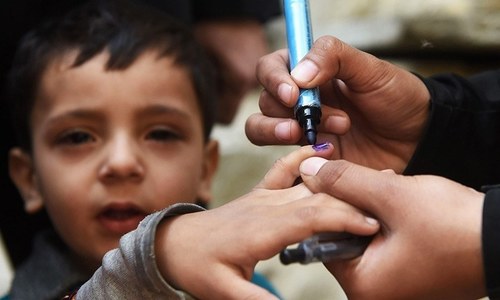ISLAMABAD/KARACHI: The daughter of an Afghan national in Karachi and the grandson of a South Waziristan resident, known for his strong opposition to polio vaccine, are the latest victims of the deadly virus, it emerged on Sunday.
Both the children are yet to see their first birthday. With the addition of these cases — one each from Khyber Pakhtunkhwa and Sindh — this year’s total number of victims of the crippling disease has reached 62, the highest since 2015.
Twelve cases were reported in 2018, while only eight children had been tested positive for the virus in 2017.
About the latest case from KP, an official of polio virology laboratory at the National Institute of Health (NIH), Islamabad, requesting anonymity said: “It was a clear case of refusal.”
The victim was a 10-month-old boy. The case was detected in South Waziristan.
“The child’s grandfather was against polio vaccine,” the official explained, adding that his father was said to be a labourer in Dubai.
Tally breaks five-year record with 62 victims
About the latest case reported from Sindh, the official said an eight-month-old girl was found infected with the virus in Karachi’s Orangi area.
“The child, whose father is an Afghan national, is resident of Sector F-11, UC-1, Orangi Town, District Karachi West. Child was alright before she developed high-grade fever, followed by weakness in both lower limbs, on 20th August. According to her mother, they took her to Dr Mohammad Yar at Shoaib Medical Center where she got medication. The doctor had notified the child as carrier of polio virus on Aug 24. But as incubation time of virus is almost three weeks, it has been finally confirmed that the child was paralysed due to polio virus,” he added.

A spokesperson for the emergency operation centre for polio in Sindh said the child had routine dose of polio. He said they were investigating by which manner she had received doses during polio campaigns. He said the child was low on immunity; “this is why repeated vaccination of oral polio vaccine is necessary”.
Another official said the child’s EPI card, carrying details of vaccinations, revealed she had defaulted Penta-II vaccine. The child was said to have no travel history and her father possessing an Afghan national identity card was said to have been living in Karachi for years.
Of the 62 polio case reported during the current year, as many as 46 cases were detected in Khyber Pakhtunkhwa (KP) only. Six cases were found in Sindh while Balochistan and Punjab reported five cases each.
According to the World Health Organisation’s Technical Advisory Group (TAG) on Polio Eradication, KP is a major barrier to polio eradication efforts in Pakistan. It termed the situation caused by the parallel polio structure in the province ‘crises’.
According to the advisory group’s recommendations, a copy of which is available with Dawn, KP has been highlighted as the core reason behind the rise in polio cases in the country. The apex evaluation body stated: “KP Emergency Operations Centre is not aligned with the federal EOC, as roles and responsibilities of KP EOC are unclear.”
TAG recommended a complete reset of KP’s polio programme, observing that the provincial polio programme has failed to identify roles and responsibilities with “two simultaneous but different strategic approaches being used with distant action plans”.
As KP shares the major burden of the total number of cases reported during the year in the country, the advisory group acknowledged that Federally Administered Tribal Areas’ (Fata) merger with KP and fake finger markings are major challenges, but observed that the communication strategies being used by the KP polio programme were “not fit for the purpose”. There are only two countries in the world, Pakistan and Afghanistan, where polio cases are still reported. Pakistan remains under a polio-linked travel restriction imposed by the WHO due to which since 2014 every person travelling aboard has to carry a polio vaccination certificate.
Published in Dawn, September 9th, 2019














































